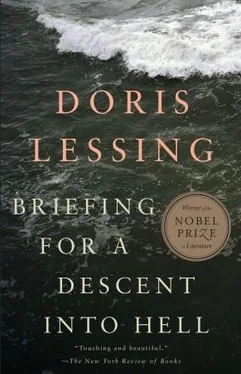Before Charles left Nancy at her mother’s he stayed over for two days, and in those days he behaved impeccably, supporting Nancy against her mother, who was cutting up rather, and taking her for walks and so on. But he was making her worse because of his attitude — not making light of the whole drama, on purpose, but it was implicit in his attitude. He spent a whole afternoon, she tells me, pointing out that he might have married her — and I, Felicity, and it would have been the same, and that we all were much too personal about the whole thing. Yes, “we are all much too personal about the whole thing.” He was talking about marriage, after all. After all, we aren’t Hottentots. Anyway, Nancy found herself half crazy, because of Charles. She describes it as feeling as if her entire life was made to look silly, and that she was not any more important than a she-cat or a bitch. Well, she was in a pretty emotional state anyway. In the end she screamed at him to go away and leave her. Of course she apologised afterwards, I insisted on it, for he had been wonderfully kind, as had Felicity. Afterwards my wife said to me that the real crisis that summer was not her leaving me to give us both a rest, but the four or five days in Charles’ company. Any more of him and she would have cut her throat, she says, or could have done if she had been able to believe it mattered whether she did or not.
I’ve chosen this last incident because again it illustrates something pretty fundamental in Charles. It is that he doesn’t even pay lip service to ordinary feelings. Perhaps they aren’t as important as we think. But perhaps I would respect him more for his attitude if I believed there was conflict involved, if he had ever thought it out, or even suffered over it, instead of its being his nature.
Now, a final incident. In spring of this year there was an evening at our house which struck me very unpleasantly indeed, but I suppose I am used to being uncomfortable where Charles is concerned. There were present myself and my wife Nancy, Charles and Felicity, a couple of other members of our team — as I like to call it! — and a visitor from America. Now I don’t like to think that we have to put on a special show for visiting firemen, but on the other hand there is such a thing as tact. Our American visitor was on his first visit to our country, and was hoping to — and may even yet succeed — spend a year with us. Charles behaved outrageously. I thought he was drunk, though he is not a drinker. It is simplest to say that he behaved like an undergraduate, if I may be permitted that oldfashioned comparison, but I am not one to be proud of flattering the youth. Charles was not even witty, which he very often is. He was boorish, badmannered, in a silly sort of way. The classics were “hogwash” and the course of lectures we had drafted together for him “a lot of pigs-swill.” And so on. I’m afraid his epithets were pretty limited, but that is the nature of undergraduate humour.
Now, if I were a reactionary and impervious to new ideas it would be easier to understand, but I am not. I cannot remember ever refusing to listen to Charles or to anyone else when they have a new angle. But to say that everything taught under the heading of Classics is pigsfeed from beginning to end, and never has been anything else, and that we have never had any idea at all of what Plato or Socrates and Pythagoras were teaching — and etc. and so on, that kind of thing — well, I did cut him off short and sharp more than once during the evening, and he went home early. Felicity his wife was annoyed, and did not go home when he did.
Now, next day he came to me with a demand that he should be empowered to arrange the coming term’s work according to ideas which I don’t really see much point in elaborating — but suffice it to say that his point of view amounts to damning generations of scholarship out of hand. He said, what was wrong with that? That it is a historical commonplace that ideas valid for centuries can vanish overnight. I may say that Charles is very fond of talking in centuries if not millennia, always the sign of a lazy mind, to my way of thinking. However, I asked him what gave him the confidence — or did I say conceit? — to talk about the work of scholars infinitely better than himself, in such terms. Did he really have no qualms at all. He said no, that it was “perfectly obvious to an unprejudiced mind” that he was right.
I must confess we quarrelled violently. I think it was the first quarrel we have ever had — astonishingly. He was abusive and derisive. Usually of course he is rather bland, or appears to be indifferent. I was patient — I am, in fact, a patient man. He became increasingly unpleasant. You understand that all the time there was the underlying implication that it must be obvious he was in the right and that I could see it if I wasn’t stupid. Finally, I asked him to leave before I lost my temper.
Next morning he rang up — as if nothing had happened. No explanation. His manner, as always, was that an unimportant incident was over. Not that he had been in the wrong, no. Not, even, that I was rigidly in the wrong and that he had had to force himself into my mould — though I suppose that was implicit. No, it was that nothing had occurred that was in the least bit important. Yet that was intolerable, because what in fact he had done, and in front of an American colleague who may yet be working with us, was to damn not only our team and its work, and of course our respective careers, his included, but all scholarship in our field to date. Or most of it. And, having done that, and behaved with shocking offensiveness, he was now quite casually arranging to meet me and discuss a series of public lectures which only the day before he had refused to consider at all and about which he had been exceedingly abusive. His manner was appropriate with saying: I’m sorry I was a bit off colour last night, but I had a headache.
I don’t know if I am succeeding in conveying to you the flavour of this particular incident.
I don’t think I can tell you more, though there is an infinite choice of such examples.
I am at this moment in the usual frame of mind when thinking about Charles — he forces me to ask myself what it means to like or dislike a person. We have always been in each other’s lives. We have our friends in common. It is my considered opinion that Charles Watkins is a destructive person. Negative, perhaps, is the better word. I find him a pain in the neck, even, far too often, a bore. I conclude from all this that we do not know very much about human relationships.
Yours very truly,
JEREMY THORNE
P.S.
I do hope you will let me know if there is anything else I can do to help. It goes without saying, I hope, that I would do anything for Charles. An idea has struck me: I don’t know if you have been contacted by Constance Mayne, or if her name has cropped up at all? She has been Charles’ mistress, or perhaps still is. She was one of his pupils. No, I have nothing to complain of in his behaviour, as she did not become his mistress until she had ceased to be his student. And I am not a moralist. I tell you this because I believe his wife Felicity does not know of her existence. If you think it might be of assistance, let me know and I’ll get hold of her address for you. She was in Birmingham when I heard last.
DEAR DOCTOR Y,
Can I “assist” you in “rehabilitating” Charles Watkins? I don’t know. Yes, I do know him, very well indeed. How very tactful you are. I was his mistress. You must know that or otherwise why did you write to me? I would be interested to know who told you, but I don’t expect you will. Well, now, about Charles … he has lost his memory? He can’t remember who he is? I am very sorry to hear it, but how does it concern me? No, don’t think I am being dishonest. I wish it did concern me, but as it happens, I think you should ask his wife Felicity Watkins. I suppose you must have done. Did she tell you to contact me? If so, it is no more than I would expect of her. What I mean by that, specifically, is that it would be so damned high-minded and above every normal human emotion, just like Charles. I am sure these things rub off. They say married people get to resemble each other, but of course I wouldn’t know.
Читать дальше
Конец ознакомительного отрывка
Купить книгу










